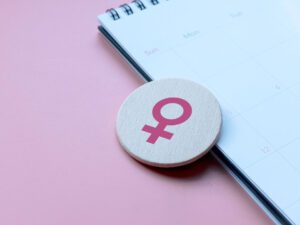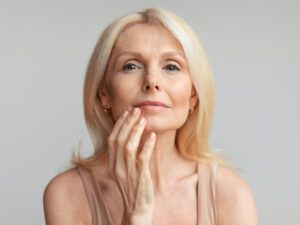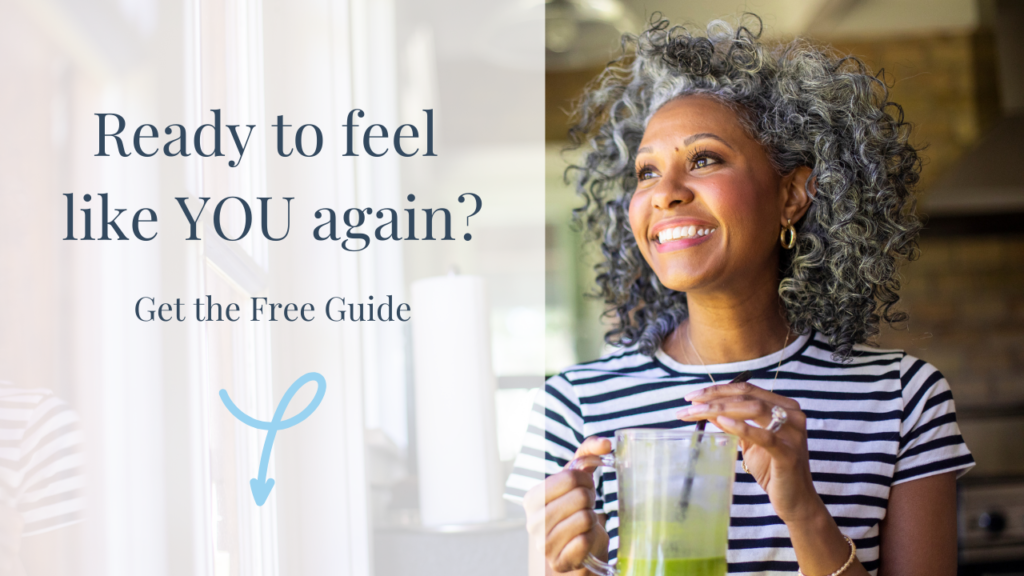Moving on from part 1 of our menopause self care guide, we’re going to start with a whole host of options for treating various different symptoms.
Practical Solutions for Common Symptoms
Hot flashes and night sweats
– Reduce all stimulants eg. caffeine, alcohol, sugar, inflammatory foods, processed foods
– Wear cooler night wear using breathable fabric
– Keep room cool
– Use adaptogens (herbs) to help the body adjust more evenly as hormones change
– Support the liver with dandelion tea, milk thistle and detox teas
– Heat in the body calls for more salads & cooling foods
– Make sure you have dark leafy greens at every meal
– Body brush (two to five times per week, depending on your skin type) to help eliminate toxins quicker

Mood swings and irritability
– Use essential oils to balance and calm moods
– Breathe abdominally or meditate morning and evening — 5mins each is fine
– Exercise — preferably outside
– Remove toxins — look at skincare and body care products first
– Have time out for self care & nurturing
– Journal — by expressing your feelings on paper, it can give perspective and time to flip to the positive
– Reduce inflammation in the diet — especially dairy, wheat and sugar
– Support your nutrition with omega vitamins for producing healthy hormones & moods
– Use adaptogens and nutrigenomics to support mood area of brain eg. Bacopa, Vitamin B, etc.
– Look at gut health — support with fibre & probiotics to help serotonin production and activate a healthy gut-brain axis, leading to better moods and increased immunity
Vaginal dryness and discomfort
– Use 200mg of high quality Omega 3
– Vitamins A, B & E may help with lubrication & vaginal DHEA may be an option depending on where you are located (talk to your GP about this)
– You may need to talk to your GP RE: use of a pessary, or even hormone therapy (depending on how bad your situation is)
– A colourful array of berries, fruits, nuts and seeds all help with healthy vaginal tissue
– High quality collagen liquids may also help this area
Fatigue and low energy
– A variety of fresh fruit and in season vegetables daily is a must
– Adequate protein (ideally 20gms per meal). Most women aren’t getting enough.
– Adding a high quality multi-vitamin with Vitamin B, Omega, Vitamin D, etc. is absolutely essential. You may also want to consider Zinc, Magnesium & liver supporting herbs
– Prioritising sleep — so look at your sleep hygiene
– Exercise — vary between strength, cardio and stretching to stimulate all parts of the nervous system and keep healthy
– Reduce any toxic load in skincare, personal care, laundry detergents and other household items
– Reduce sugar, gluten, dairy to see if that helps. For some it will & others it may make no difference
– Look at reducing inflammatory foods (including nightshades: potatoes, tomatoes, capsicum, etc.)
– Meditation may help by resting the nervous system (and helping improve repair mechanisms in the body) naturally.
– Improve gut health with more fibre, probiotics & healthy mental state for “processing” issues that are constantly coming up (that you may be “chewing over”)
– Connect with like minded women, as social interaction can help give you a lift and boost endorphins
– Keep to a daily routine — this may mean making your bed every morning or other healthy practices — to trigger happy hormones
Memory and concentration issues
– Exercise helps stimulate the memory centre of the brain
– Use essential oils to trigger memory and concentration — rosemary, basil, lemon etc. are great to start with
– Herbs like Ginseng and Ginkgo Biloba, Bacopa
– Vitamins may help like Vitamin B, Vitamin D, Omega vitamins & Magnesium
– Nootropics (natural compounds that activate brain pathways naturally — also known as “smart drugs”) may help by re-firing certain neurons that help stimulate brain function in this area
– Meditation helps calm the nervous system, helping to stimulate the memory centre
– Social connection (and having stimulating conversations) can help awaken brain pathways
– Brain games (the key is to do something different regularly, so that you don’t get used to a pattern)
– Avoid alcohol & other chemical substances
– Get your iron levels checked — they may be low, especially in perimenopause
Moving on from the Menopause Symptoms Checklist – Diet and Nutrition!
Why the Occasional Treat Is Good for Your Mental Health
Feeling like you are depriving yourself all the time is not the way to create joy and love in your life. Joy and love are two emotions that you need to fire up your brain — keeping you sane when other more challenging symptoms may be getting you down.
Cheating on a strict diet can be great — as long as you can connect to an emotion, enjoy the moment, and then feel satisfied (as opposed to addicted).
Incorporating Phytoestrogen-Rich Foods into Your Cheat Foods
These help iron out the high peaks and lows of moods, heat, anger and dry itchy skin (amongst other symptoms) during the time that estrogen and progesterone and acting like a roller coaster. The body always wants to stay in balance, and phytoestrogenic foods help the body balance quicker and more naturally.
These foods may include soy and soy products like tofu and tempah, legumes such as chick peas and beans, sprouted foods like alfalfa, sprouts, mung beans and soy sprouts. Also consider Lignins — found in linseed, flaxseed, grains, vegetables etc.
If your “cheat” on your diet includes any of these foods, then you’re on the right track.
Staying Hydrated
As you transition through perimenopause, the part of the brain that tells you that you’re thirsty sometimes isn’t stimulated or recognised by you — so you eat, rather than hydrate.
It is, therefore, essential to form a scheduled habit of drinking water (even if you don’t feel thirsty) to make sure you don’t dehydrate. Many electrolyte functions require good hydration — and good hydration also ensures that our body communicates with itself effectively. Most women should aim for a minimum of 2 litres of pure water per day. Break that down to 500ml by morning tea, 500ml by lunch, 500ml by afternoon tea & 500ml before 9pm.
Avoiding Trigger Foods and Drinks
Gut changes happen as your oestrogen levels change — this can affect what foods you can tolerate, which may be different from what has sat well with you in the past.
Foods that change the pH of the gut such as alcohol, sugar, preservative loaded drinks — and foods like takeaways and restaurant meals that are richer — are among the foods that you need to look at. Dairy, gluten and night shades may need to be addressed as well. Sometimes just cutting down is okay, but sometimes they need to go!
Remember — whole foods are your friend in menopause, and watch how many “packet foods” you are consuming on a daily basis.

Exercise and Physical Activity
Benefits of Regular Exercise for Menopause Symptoms
Regular exercise has been shown to have numerous benefits during perimenopause and menopause. It can greatly improve mood, alleviate stress and anxiety, and even help with sleep. Exercise also helps to maintain bone density, which is particularly important for women during menopause who are at increased risk of osteoporosis. Basically, incorporating regular exercise into your routine during perimenopause and menopause can greatly improve your physical and mental well-being.
Types of exercise to consider
Some types of exercise that you may want to consider to deal with menopause symptoms include low-impact activities such as yoga, Pilates, or swimming, which can help build muscle without putting added stress on joints. Strength training can help maintain muscle mass, which can help with maintaining a healthy weight and preventing metabolic diseases. Additionally, incorporating cardiovascular exercise such as brisk walking or cycling can help improve heart health and boost overall energy levels.
Tips for staying motivated and consistent
Staying motivated and consistent with exercise can be challenging, especially if feel a lack of energy. It helps to set achievable goals, such as starting with a simple 10-minute walk and gradually increasing the duration and intensity of the workout. Creating a schedule and sticking to it can also help establish a routine that leads to consistent exercise. Finding an exercise buddy or joining a fitness class can provide additional support and motivation. Finally, rewarding oneself after each workout, such as enjoying a favorite treat or taking a relaxing bath, can help maintain motivation.
When to See a Healthcare Provider
As women approach and live through menopause, they may experience a wide range of symptoms ranging from mild to severe. While some women opt to manage their symptoms with lifestyle changes (like our menopause symptoms checklist & solutions above), others may need to seek professional help. Some signs that it’s time to seek professional help include:
- Symptoms that interfere with daily life: If your symptoms are impacting your ability to carry out your daily activities, like working or taking care of your family, it may be time to see a healthcare provider.
- Severe mood changes: If you’re experiencing prolonged feelings of sadness or anxiety, it’s important to seek help. Mental health professionals can help you manage these symptoms and improve your overall well-being.
- Vaginal dryness or painful intercourse: As estrogen levels decline during menopause, some women may experience vaginal dryness or pain during intercourse. If this becomes a prolonged problem that can’t be fixed with natural remedies and/or lifestyle changes, it can be managed with prescription medications prescribed by your healthcare provider.
Remember, every woman experiences this period differently, so it’s important to listen to your body and seek professional help if your menopause symptoms are infringing upon your ability to live your day-to-day life.
Taking Control of Your Menopause Journey
If you find yourself frustrated in attempting to follow the above solutions, or if — for instance — your symptoms feel insurmountable but you are committed to relieving them naturally (instead of with drastic measures such as hormone therapy) we at Better Body Beauty offer a personalised natural menopause treatment for Australia: The Thrive Through Menopause program. We can help you regain your energy & zest for life while you have the support of the other women in the course to keep you motivated & have a sense of camaraderie in your journey. Sign up today or use our contact page if you require more information!





